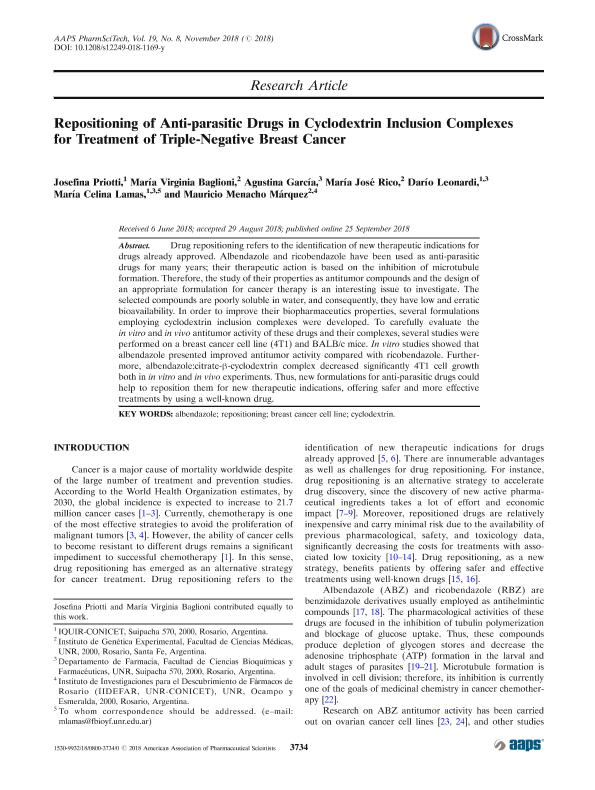Artículo
Repositioning of Anti-parasitic Drugs in Cyclodextrin Inclusion Complexes for Treatment of Triple-Negative Breast Cancer
Priotti, Josefina ; Baglioni, María Virginia
; Baglioni, María Virginia ; García, Agustina
; García, Agustina ; Rico, Maria Jose
; Rico, Maria Jose ; Leonardi, Darío
; Leonardi, Darío ; Lamas, Maria Celina
; Lamas, Maria Celina ; Menacho Márquez, Mauricio Ariel
; Menacho Márquez, Mauricio Ariel
 ; Baglioni, María Virginia
; Baglioni, María Virginia ; García, Agustina
; García, Agustina ; Rico, Maria Jose
; Rico, Maria Jose ; Leonardi, Darío
; Leonardi, Darío ; Lamas, Maria Celina
; Lamas, Maria Celina ; Menacho Márquez, Mauricio Ariel
; Menacho Márquez, Mauricio Ariel
Fecha de publicación:
11/2018
Editorial:
Springer
Revista:
AAPS Pharmscitech
e-ISSN:
1530-9932
Idioma:
Inglés
Tipo de recurso:
Artículo publicado
Clasificación temática:
Resumen
Drug repositioning refers to the identification of new therapeutic indications for drugs already approved. Albendazole and ricobendazole have been used as anti-parasitic drugs for many years; their therapeutic action is based on the inhibition of microtubule formation. Therefore, the study of their properties as antitumor compounds and the design of an appropriate formulation for cancer therapy is an interesting issue to investigate. The selected compounds are poorly soluble in water, and consequently, they have low and erratic bioavailability. In order to improve their biopharmaceutics properties, several formulations employing cyclodextrin inclusion complexes were developed. To carefully evaluate the in vitro and in vivo antitumor activity of these drugs and their complexes, several studies were performed on a breast cancer cell line (4T1) and BALB/c mice. In vitro studies showed that albendazole presented improved antitumor activity compared with ricobendazole. Furthermore, albendazole:citrate-β-cyclodextrin complex decreased significantly 4T1 cell growth both in in vitro and in vivo experiments. Thus, new formulations for anti-parasitic drugs could help to reposition them for new therapeutic indications, offering safer and more effective treatments by using a well-known drug.
Palabras clave:
ALBENDAZOLE
,
BREAST CANCER CELL LINE
,
CYCLODEXTRIN
,
REPOSITIONING
Archivos asociados
Licencia
Identificadores
Colecciones
Articulos (IIDEFAR)
Articulos de INSTITUTO DE INVESTIGACIONES PARA EL DESCUBRIMIENTO DE FARMACOS DE ROSARIO
Articulos de INSTITUTO DE INVESTIGACIONES PARA EL DESCUBRIMIENTO DE FARMACOS DE ROSARIO
Articulos(CCT - ROSARIO)
Articulos de CTRO.CIENTIFICO TECNOL.CONICET - ROSARIO
Articulos de CTRO.CIENTIFICO TECNOL.CONICET - ROSARIO
Articulos(IQUIR)
Articulos de INST.DE QUIMICA ROSARIO
Articulos de INST.DE QUIMICA ROSARIO
Citación
Priotti, Josefina; Baglioni, María Virginia; García, Agustina; Rico, Maria Jose; Leonardi, Darío; et al.; Repositioning of Anti-parasitic Drugs in Cyclodextrin Inclusion Complexes for Treatment of Triple-Negative Breast Cancer; Springer; AAPS Pharmscitech; 19; 8; 11-2018; 3734-3741
Compartir
Altmétricas



